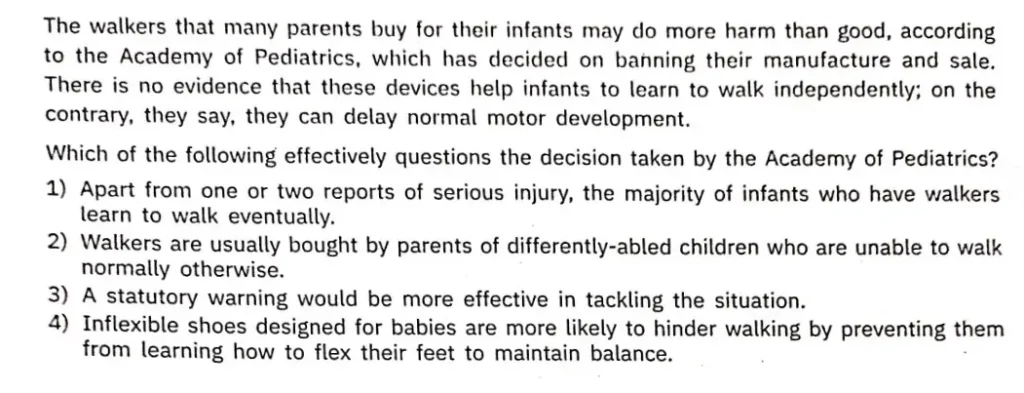Homework Help: Questions and Answers: The walkers that many parents buy for their infants may do more harm than good, according to the Academy of Pediatrics, which has decided on banning their manufacture and sale. There is no evidence that these devices help infants to learn to walk independently; on the contrary, they say, they can delay normal motor development. Which of the following effectively questions the decision taken by the Academy of Pediatrics?

1) Apart from one or two reports of serious injury, the majority of infants who have walkers learn to walk eventually.
2) Walkers are usually bought by parents of differently abled children who are unable to walk normally otherwise.
3) A statutory warning would be more effective in tackling the situation.
4) Inflexible shoes designed for babies are more likely to hinder walking by preventing them from learning how to flex their feet to maintain balance.
Answer:
First, let’s understand the Academy of Pediatrics’ position:
- They want to ban the manufacture and sale of infant walkers.
- They claim walkers don’t help infants learn to walk independently.
- They argue walkers can delay normal motor development.
To effectively question the decision taken by the Academy of Pediatrics regarding the banning of infant walkers, we need to identify an option that provides a reasonable counterargument or raises doubts about the necessity or validity of the ban. Let’s analyze each option:
Given Options: Step by Step Answering
1) Apart from one or two reports of serious injury, the majority of infants who have walkers learn to walk eventually.
- This option suggests that most infants eventually learn to walk, even if they use walkers. However, it doesn’t directly address the concern that walkers may delay motor development. It only points out that serious injuries are rare, which doesn’t effectively question the decision if the concern is developmental delays.
2) Walkers are usually bought by parents of differently abled children who are unable to walk normally otherwise.
- This option could effectively question the decision by suggesting that walkers serve an essential purpose for differently abled children, providing them with mobility they might not otherwise have. This questions the blanket ban by highlighting a potential benefit that isn’t being considered.
3) A statutory warning would be more effective in tackling the situation.
- This option questions the decision by proposing an alternative solution: issuing warnings instead of banning. It implies that parents could be informed about the potential risks, allowing them to make informed choices rather than outright banning the walkers.
4) Inflexible shoes designed for babies are more likely to hinder walking by preventing them from learning how to flex their feet to maintain balance.
- This option shifts focus away from walkers and points out that other factors, like inflexible shoes, could also hinder walking. While it highlights a different issue, it doesn’t directly question the decision to ban walkers.
Final Answer:
Based on the above analysis, the option that most effectively questions the decision by the Academy of Pediatrics is:
3) A statutory warning would be more effective in tackling the situation.
This option provides an alternative approach, suggesting that informing parents with warnings might address the concerns without need for a ban of walkers completely.
Learn More: Homework Help
Q. Rio Awareness Assessment: Select as appropriate about Human Errors
Q. What is referred to as “Ghost Text” in GitHub Copilot?
Q. What is one of the uses of Diagnostic Al?
Q. Which type of Al system attempts to mimic the way the human brain processes information?

